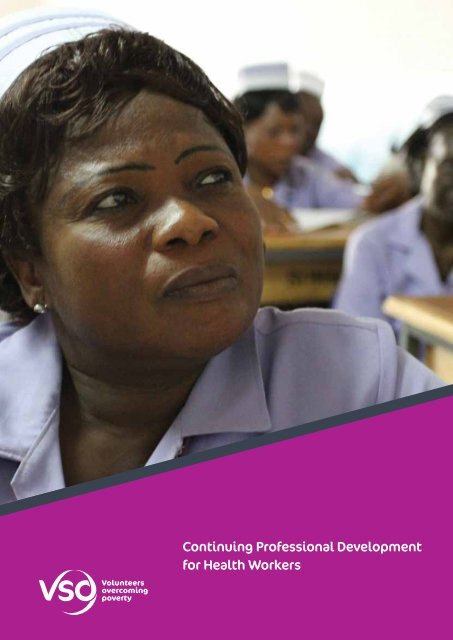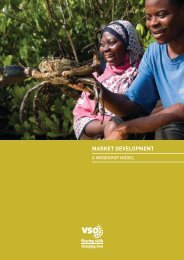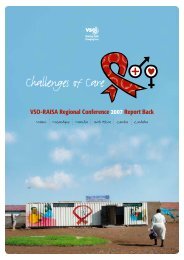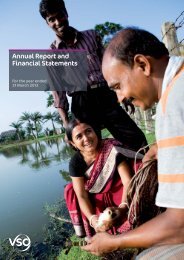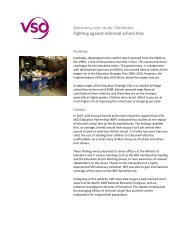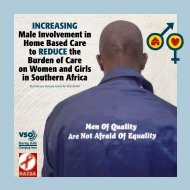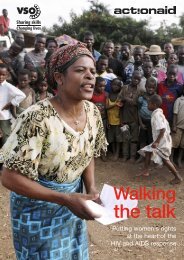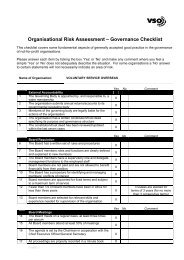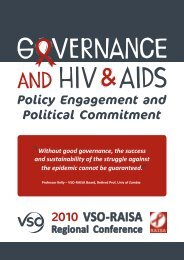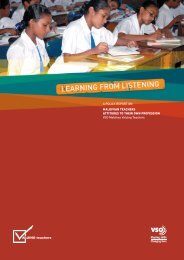Continuing professional development for health workers - VSO
Continuing professional development for health workers - VSO
Continuing professional development for health workers - VSO
You also want an ePaper? Increase the reach of your titles
YUMPU automatically turns print PDFs into web optimized ePapers that Google loves.
<strong>Continuing</strong> Professional Development<br />
<strong>for</strong> Health Workers
Introduction<br />
The <strong>development</strong> of a skilled motivated work<strong>for</strong>ce is essential<br />
to raising standards of patient care and addressing challenges<br />
such as <strong>health</strong> worker shortage. <strong>Continuing</strong> Professional<br />
Development (CPD) is essential <strong>for</strong> updating skills and the<br />
<strong>development</strong> of a <strong>professional</strong> ethos <strong>for</strong> all staff cadres,<br />
including volunteers. To be most effective CPD needs to be<br />
carried out within a national framework, which addresses<br />
issues such as licensing and accreditation. It needs to be<br />
guided by the <strong>health</strong> needs of the community, with specific<br />
reference to primary care and the more remote areas<br />
of the country. Planned, cost effective CPD is essential if<br />
national programmes are to achieve the <strong>health</strong> Millennium<br />
Development Goals (MDGs) and move towards providing<br />
Universal Health Coverage <strong>for</strong> the whole population.<br />
approaches. CPD is a vital tool <strong>for</strong> success in all the initiatives<br />
undertaken to address <strong>health</strong> worker shortages, as seen<br />
from the following examples. “In Tanzania the country<br />
has recognised that a key part of its response must be to<br />
increase the productivity of existing <strong>health</strong> <strong>workers</strong> through<br />
CPD.” (<strong>VSO</strong> Tanzania) CPD is an essential part of successful<br />
task-shifting as in Mozambique where clinical officers have<br />
been trained to carry out caesarean sections 3 . The WHO<br />
report on community <strong>health</strong> volunteers says that “there is<br />
universal agreement that continuing or refresher training is<br />
as important as initial training.” 4 CPD improves motivation<br />
and retention, it “provides opportunities <strong>for</strong> <strong>professional</strong><br />
<strong>development</strong>, staff are motivated and there<strong>for</strong>e can be<br />
retained.” (<strong>VSO</strong> Zambia) CPD directly improves patient care<br />
by updating skills and maintaining effective delivery of the<br />
<strong>health</strong> task under changing conditions. It can improve the<br />
way <strong>health</strong> <strong>workers</strong> interact with patients by improving<br />
competencies which “will also contribute to more confidence<br />
with consequent improvement in attitudes.” (<strong>VSO</strong> Mongolia)<br />
Key debates<br />
Training focus – Some countries focus on pre-service training<br />
to address <strong>health</strong> worker shortages and fail to see the<br />
relevance of CPD. While both are needed, CPD increases<br />
<strong>health</strong> worker productivity, is quicker, more cost effective and<br />
improves retention. It builds <strong>for</strong> the future by strengthening<br />
the <strong>health</strong> system, whilst also developing <strong>professional</strong><br />
approaches.<br />
Why is it important<br />
Good <strong>health</strong> is a pre-requisite <strong>for</strong> national <strong>development</strong>. “At<br />
the heart of each and every <strong>health</strong> system, the work<strong>for</strong>ce<br />
is central to advancing <strong>health</strong>. There is ample evidence that<br />
worker numbers and quality are positively associated with<br />
immunisation coverage, outreach of primary care, and infant,<br />
child and maternal survival.” 1<br />
“<strong>Continuing</strong> Professional Development <strong>for</strong> <strong>health</strong> <strong>workers</strong><br />
is defined as the process by which individual <strong>health</strong>care<br />
<strong>professional</strong>s maintain and improve standards of <strong>health</strong>care<br />
practice, through <strong>development</strong> of knowledge, skills, attitudes<br />
and behaviour.” 2 It covers a range of activities such as<br />
training, supervision, per<strong>for</strong>mance management, licensing<br />
and accreditation <strong>for</strong> existing employed staff and volunteers.<br />
CPD increases <strong>health</strong> worker productivity, can be very cost<br />
effective, improves retention and builds <strong>for</strong> the future by<br />
strengthening the <strong>health</strong> system and developing <strong>professional</strong><br />
Primary Care emphasis – the initial focus of CPD tends to be<br />
on hospital care. There needs to be an equal focus on primary<br />
<strong>health</strong> care, where most people come into contact with the<br />
<strong>health</strong> system. CPD should include prevention and <strong>health</strong><br />
promotion activities as well as curative care, and be delivered<br />
to <strong>health</strong> volunteers as well as paid staff. Planned, properly<br />
targeted CPD is essential to address the <strong>health</strong> MDGs and<br />
to support ef<strong>for</strong>ts to ensure Universal Health Coverage in all<br />
countries.<br />
Position within national policy – a key message emerging<br />
from <strong>VSO</strong> experience, the World Health Organisation and<br />
other international agencies is that CPD should be part of<br />
a national training plan, in support of the human resources<br />
strategy determining the cadres and numbers of staff<br />
required and their skills. A major ef<strong>for</strong>t is required to bring<br />
all training activity within this framework: current provision<br />
is fragmentary and delivered by a very wide range of training<br />
providers. Low <strong>health</strong> budgets make it difficult to support<br />
CPD effectively, especially as most of the funding comes from<br />
1<br />
WHO, ‘World Health Report: Working Together <strong>for</strong> Health’, 2006<br />
2<br />
Laura Golding and Ian Gray, ‘<strong>Continuing</strong> Professional Development – a Brief Guide, 2006<br />
3<br />
Human Resources <strong>for</strong> Health, ‘Task shifting: the answer to the human resources crisis in Africa, 2009<br />
4<br />
WHO, Community Health Workers: what do we know about them’, 2007
international aid. The ideal must be to prioritise CPD and to<br />
move towards commitments such as the Abuja Declaration<br />
2001, whereby African countries committed to spend 15%<br />
of the national budget on <strong>health</strong>care. The UK Royal College<br />
of Midwives states “to get that appropriately educated<br />
work<strong>for</strong>ce, you do need acceptance by government in policy<br />
that is backed by finances.” 5<br />
Quality, Licensing and Accreditation - the foundation of a<br />
strong CPD system is agreed standards of care, accredited by<br />
a licensed organisation within each country. Licensure and<br />
certification also apply to <strong>health</strong> facilities and educational<br />
institutions: they are also eligible <strong>for</strong> accreditation as an<br />
organisation capable of delivering reliable quality training<br />
and support. In most countries there is a need to build<br />
capacity in <strong>professional</strong> associations and training institutions,<br />
to ensure good quality training and <strong>professional</strong> leadership<br />
and advocacy <strong>for</strong> CPD. Countries differ in their approach to<br />
licensing and accrediting policy, some making it mandatory<br />
and others taking a more voluntary approach to CPD,<br />
however, more <strong>for</strong>mal systems are the way of the future.<br />
numbers and capacity of training institutions and integrate<br />
donor programmes with national strategies to provide a<br />
common approach to national work<strong>for</strong>ce planning, standards<br />
and delivery of training.<br />
National policy on Licensing and Accreditation<br />
to identify and promote country-wide standards in<br />
<strong>health</strong>care. Job roles should be linked to competency-based<br />
skills. Countries should move towards compulsory licensing of<br />
staff and training institutions in the interests of strengthening<br />
the <strong>health</strong> system and raising the status of <strong>health</strong> <strong>workers</strong>.<br />
Professional leadership is required from senior clinicians,<br />
managers and the <strong>professional</strong> associations in support of<br />
national goals <strong>for</strong> CPD. Senior clinicians should act as role<br />
models at the local level and participate in supervision and<br />
clinical meetings.<br />
Partnering with equivalent institutions or associations<br />
abroad would help developing countries to set up and<br />
maintain structures <strong>for</strong> continuing training. There is much<br />
international support available, <strong>for</strong> example, the UK Royal<br />
College of General Practitioners builds partnerships with<br />
overseas <strong>health</strong> organisations. Individual hospitals in the<br />
North have established partnerships with hospitals in<br />
developing countries. All clinicians should be enabled to align<br />
themselves with international networks.<br />
Employer support in the home facility is essential to the<br />
<strong>development</strong> of CPD <strong>for</strong> individual staff and <strong>for</strong> organisation<br />
wide adoption of standards. There must be employer support<br />
<strong>for</strong> linking job roles to competencies, time devoted to CPD<br />
and the adoption of minimum standards such as adequate<br />
training to support task shifting.<br />
<strong>VSO</strong>’s Position<br />
<strong>VSO</strong> strongly supports CPD as a key part of any national<br />
<strong>health</strong> service strategy to develop and maintain a skilled<br />
motivated work<strong>for</strong>ce. At its heart is life-long learning <strong>for</strong><br />
all staff cadres and <strong>health</strong> volunteers. <strong>VSO</strong> believes that<br />
the following enabling conditions need to exist to ensure<br />
successful implementation of CPD programmes:<br />
National Human Resources Plan to set targets <strong>for</strong> the<br />
numbers and cadres of staff the country needs, identify the<br />
skills they require and introduce a national training plan<br />
to deliver planned outcomes. The plan will also look at the<br />
Financial support at local and national level <strong>for</strong> CPD is<br />
essential. There must be investment in human resources<br />
planning and training plans. Training institutions must be<br />
properly resourced and staff skills developed. Financial<br />
support is needed <strong>for</strong> an effective infrastructure, which<br />
supports and offers CPD nation-wide.<br />
<strong>VSO</strong> identifies the following as good strategies to ensure a<br />
sustainable CPD programme:<br />
Invest in <strong>professional</strong> associations and training institutions<br />
– build the capacity of the <strong>professional</strong> associations so that<br />
they can initiate, provide and promote CPD. Work with the<br />
government to enable them to play a part in regulating the<br />
5<br />
APPG on Global Health and Africa APPG, ‘All the Talents: how new roles and better teamwork can release potential and improve <strong>health</strong> services’, 2012
training, education and practice of <strong>health</strong> <strong>workers</strong>, which<br />
includes registration processes and licensure examinations.<br />
Similarly, build the capacity of training institutions to<br />
guarantee compliance with the national strategy; evaluate<br />
and develop skills at individual tutor level to meet new<br />
curricula and delivery methods.<br />
Support the <strong>development</strong> of a CPD policy – develop an<br />
employment and pay policy to acknowledge the need <strong>for</strong><br />
CPD and provide employer direction <strong>for</strong> CPD activities <strong>for</strong><br />
example allocating time <strong>for</strong> CPD. Work towards licensing<br />
and accreditation at national level to provide a legal basis <strong>for</strong><br />
improving standards and the status of <strong>health</strong> <strong>workers</strong>.<br />
based skills as the basis of supervision and per<strong>for</strong>mance<br />
management. Adapt competencies to the local context.<br />
Develop training courses – work with <strong>professional</strong><br />
associations and training institutions to develop courses and<br />
materials to fill skill gaps. Update the skills of clinical tutors.<br />
Emphasise both the cascading of training to local institutions<br />
and the importance of on-the-job training.<br />
Invest in managers – work with government and training<br />
institutions to develop training <strong>for</strong> <strong>health</strong> managers. Carry<br />
out analysis related to their tasks of planning, budgeting,<br />
monitoring and evaluation. Support <strong>development</strong> of <strong>health</strong><br />
management courses and tutors to deliver them.<br />
Provide evidence of effectiveness – work with government<br />
and other stakeholders to show how CPD materially improves<br />
per<strong>for</strong>mance, patient care and outcomes. Draw on any<br />
research <strong>for</strong> example the evaluation of CPD supported by <strong>VSO</strong><br />
in Malawi.<br />
Support localisation of training – because of its benefits <strong>for</strong><br />
training relevance, rural staff access and cost effectiveness.<br />
Support on-the-job training <strong>for</strong> practical application of skills<br />
in the workplace, <strong>development</strong> of supervision and costeffectiveness.<br />
Draw on <strong>VSO</strong> Sierra Leone/UNICEF research<br />
into the value <strong>for</strong> money of on-the-job training versus<br />
centralised training.<br />
Support multi-disciplinary approaches – encourage clinicians<br />
in taking a multi-disciplinary approach to CPD, with a team<br />
approach rather than working in <strong>professional</strong> isolation.<br />
Support the use of clinical pathways where the roles and<br />
tasks of all staff cadres are clear.<br />
Support innovation – by supporting pilots <strong>for</strong> new ways of<br />
delivering CPD. Evaluate the potential <strong>for</strong> scale-up. Invest<br />
further in those which can show good training outcomes and<br />
value <strong>for</strong> money. Draw on innovation in other countries in<br />
similar circumstances. Enable CPD <strong>for</strong> new staff cadres which<br />
may arise from innovation.<br />
<strong>VSO</strong> identifies the following as being essential to the effective<br />
<strong>development</strong> and maintenance of CPD at national level:<br />
Build HR capacity – work with government to build capacity<br />
in human resource planning. Support skills gap analysis<br />
projects <strong>for</strong> particular professions, with plans to cover all<br />
<strong>health</strong> cadres.<br />
Human Resource Management In<strong>for</strong>mation System –<br />
support <strong>development</strong> of a system covering all staff, their post,<br />
remuneration, job role and qualifications.<br />
<strong>VSO</strong> with its partners will:<br />
Advocate <strong>for</strong> CPD – on the basis of lifelong learning <strong>for</strong> a<br />
skilled motivated work<strong>for</strong>ce.<br />
Provide an evidence base – on the effectiveness and value<br />
<strong>for</strong> money of CPD approaches by working with providers and<br />
the government.<br />
Support capacity building – of <strong>professional</strong> associations and<br />
training institutions, individual facilities and <strong>health</strong> ministries,<br />
to work together to develop, resource and deliver enhanced<br />
CPD <strong>for</strong> all <strong>health</strong> cadres in line with national plans.<br />
Promote international partnerships – <strong>for</strong> sharing of expertise<br />
and in<strong>for</strong>mation, including exchange between countries in<br />
similar circumstances.<br />
Promote job descriptions – support the <strong>development</strong> of job<br />
descriptions <strong>for</strong> all roles. Link job descriptions to competency
On-the-job training <strong>for</strong><br />
anaesthetists, Ethiopia<br />
As the only anaesthetic doctor at Yekatit<br />
12 hospital in Addis Ababa, Dr Tom<br />
Bash<strong>for</strong>d helped to improve the entire<br />
cycle of surgical care in a country where<br />
such specialist skills are rare. During<br />
his year working alongside the hospital<br />
team, Tom introduced simple, but lifesaving<br />
practices. After observing the<br />
way operations were being carried out,<br />
he implemented the routine use of the<br />
globally recognised WHO Safe Surgery<br />
Checklist.<br />
“The turning point came early on when I<br />
was operating on a boy called Binyam.”<br />
Tom said Binyam had a huge tumour<br />
on the side of his face, which started<br />
to bleed heavily during an operation,<br />
putting his life in danger. Blood arrived<br />
from the laboratory just in time to<br />
save his life, but Tom observed how it<br />
should have been available be<strong>for</strong>e the<br />
operation. Binyam’s surgery prompted<br />
Tom to teach colleagues how to use a<br />
Safe Surgery Checklist; a simple piece of<br />
paper that is shown to reduce surgery<br />
related deaths by as much as 50% in the<br />
developing world.<br />
Tom was able to introduce other life<br />
saving practices. He left behind a team<br />
with the skills to keep patients alive<br />
through surgery and crucially, to be able<br />
to train more staff to do the same.<br />
Nurses and midwives evaluate<br />
CPD Programme, Malawi<br />
In June 2010 the Nurses and Midwives<br />
Council of Malawi (NMCM) launched<br />
a mandatory CPD programme <strong>for</strong><br />
all nurses and midwives practising<br />
in Malawi. However, in 2012 the<br />
NMCM recognised that meeting the<br />
requirements of the CPD programme<br />
was still presenting a challenge <strong>for</strong> some<br />
nurses and midwives.<br />
With the support of <strong>VSO</strong> and I-TECH<br />
(International Training and Education<br />
Centre <strong>for</strong> Health) an in-depth<br />
evaluation of the CPD Programme<br />
was initiated. In September 2012 the<br />
evaluation team began identifying the<br />
objectives and developing gap analysis<br />
work plans. In November 2012 the team<br />
began conducting a series of interviews<br />
with the nurses and midwives. In an<br />
ef<strong>for</strong>t to ensure as many <strong>health</strong> facilities<br />
and educational institutions across the<br />
country were represented a selection of<br />
nurses and midwives were consulted in<br />
either Lilongwe or Blantyre.<br />
The full CPD Evaluation Report will be<br />
published in March but preliminary<br />
findings indicate a number of key areas<br />
where the CPD Programme requires<br />
strengthening. One is how nurses and<br />
midwives working as lone practitioners<br />
in rural <strong>health</strong> centres require additional<br />
support to attend CPD activities.<br />
Another is that CPD facilitators need ongoing<br />
support to ensure they are kept<br />
updated and that a robust approach<br />
to communication and networking<br />
would benefit all stakeholders. <strong>VSO</strong> and<br />
I-TECH will now proceed to address the<br />
evaluation findings.<br />
Competency based training <strong>for</strong><br />
management, Mongolia<br />
Recent emphasis on primary <strong>health</strong><br />
care and implementation of the MoH<br />
Ministry of Health Sectoral Strategic<br />
Master Plan (HSMP) has highlighted the<br />
need to improve the management skills<br />
in <strong>health</strong> facilities at all levels of the<br />
<strong>health</strong> service in Mongolia.<br />
The <strong>development</strong> of a practice-oriented<br />
in-service training programme began<br />
with the agreement that the core<br />
management skills required by the<br />
facility management teams were based<br />
on the six stages of the planning cycle<br />
described in the HSMPS’s planning and<br />
budgeting framework. Using the MoH<br />
planning cycle and a task analysis table<br />
each stage was divided into the tasks,<br />
skills, knowledge and attitudes required<br />
to carry out each task. The table was<br />
also used to develop training objectives:<br />
organise the training modules; develop<br />
training materials and participatory<br />
learning methods and to guide the<br />
training of the trainers. The programme<br />
has <strong>for</strong>malised the use of Competency<br />
Based Training.<br />
Thirty trainers have conducted training<br />
of the main tertiary level hospital<br />
management teams using the training<br />
programme and the MoH has now<br />
instructed all hospitals to undergo this<br />
training. <strong>VSO</strong> Mongolia, supported<br />
by the Asian Development Bank, was<br />
instrumental in designing the approach,<br />
processes, materials and various<br />
components of the practice oriented<br />
Management in-Service Training<br />
Programme, training the trainers and<br />
the demonstration training events.
Valuing Health Workers is a <strong>VSO</strong> research and advocacy initiative,<br />
which supports the achievement of the <strong>health</strong>-related Millennium<br />
Development Goals.<br />
Valuing Health Workers research has already been completed in<br />
Uganda, with Cambodia being the second country to undertake<br />
similar research. Following on from the research, advocacy strategies<br />
will be created, which will include the <strong>development</strong> of volunteer<br />
placements in civil society coalitions, <strong>professional</strong> associations and<br />
<strong>health</strong> ministries.<br />
<strong>VSO</strong> supports the work of the Health Work<strong>for</strong>ce Advocacy Initiative<br />
(HWAI). HWAI is the civil-society led network of the Global Health<br />
Work<strong>for</strong>ce Alliance (GHWA) and engages in evidence-based advocacy<br />
with the goal of enabling everyone to access skilled, motivated and<br />
supported <strong>health</strong> <strong>workers</strong> who are part of well-functioning <strong>health</strong><br />
systems.www.<strong>health</strong>work<strong>for</strong>ce.info/HWAI/Welcome.html<br />
<strong>VSO</strong> works with Action <strong>for</strong> Global Health – a cross-European network<br />
of <strong>health</strong> <strong>development</strong> organisations. The network calls on European<br />
governments and the European Commission to act now to support<br />
developing countries to achieve the <strong>health</strong>-related Millennium<br />
Development Goals. www.action<strong>for</strong>global<strong>health</strong>.eu<br />
For more in<strong>for</strong>mation about <strong>VSO</strong>’s Valuing Health Workers research<br />
and advocacy initiative please contact Clive Ingleby (<strong>VSO</strong>’s Global<br />
Adviser <strong>for</strong> <strong>health</strong>/HIV and AIDS): cliveingleby@vso.org.uk<br />
If you would like to volunteer with <strong>VSO</strong> please visit:vsointernational.<br />
org/volunteer<br />
In addition to this publication, the following research and publications<br />
may also be of interest:<br />
• Participatory Advocacy: A Toolkit <strong>for</strong> Staff, Volunteers<br />
and Partners – this manual is an easily accessible guide<br />
to lobbying and campaigning, and can be used by <strong>health</strong><br />
activists and other campaigners <strong>for</strong> social justice.<br />
• Our Side of the Story: Ugandan Health Workers Speak<br />
Up – a report which documents the experiences of over<br />
120 Ugandan <strong>health</strong> <strong>workers</strong>, along with inputs from<br />
representatives of civil society, trade unions, <strong>professional</strong><br />
associations and regulatory councils, and includes<br />
recommendations <strong>for</strong> policy change.<br />
• Ugandan Health Workers Speak: The Rewards and the<br />
Realities – a report of initial findings of the Valuing Health<br />
Workers research in Uganda.<br />
• Valuing Health Workers in Cambodia – a short briefing on the<br />
research approach in Cambodia.<br />
• Valuing Health Workers: Implementing Sustainable<br />
Interventions to Improve Health Worker Motivation (Malawi)<br />
– a report drawing together existing research in Malawi, and<br />
identifying recommendations to tackle the human resources<br />
<strong>for</strong> <strong>health</strong> (HRH) crises.<br />
• Community Health Volunteering: Position Paper – this<br />
2012 report looks at how the <strong>health</strong> worker crisis has led to<br />
investment in community <strong>health</strong> volunteers, key debates, the<br />
benefits and the risks as well as giving <strong>VSO</strong>’s position on best<br />
practice.<br />
• Local Volunteering Responses to Health Care: Challenges and<br />
Lessons from Malawi, Mongolia and the Philippines – this<br />
report looks at how community volunteers can be involved in<br />
delivering <strong>health</strong> services.<br />
• Brain Gain: Making Health Worker Migration Work <strong>for</strong> Rich<br />
and Poor Countries. <strong>VSO</strong> Briefing: the perspective from<br />
Africa.<br />
• The IMF, the Global Crisis and Human Resources <strong>for</strong> Health<br />
– this 2010 report, written with the Stop AIDS Campaign<br />
and Action <strong>for</strong> Global Health, shows how the International<br />
Monetary Fund (IMF) constrains the fiscal space <strong>for</strong><br />
developing countries and impedes the recruitment of muchneeded<br />
new <strong>health</strong> <strong>workers</strong>.<br />
•<br />
To access any of these publications, please visit: www.<br />
vsointernational.org/<strong>health</strong><br />
<strong>VSO</strong> International<br />
100 London Road<br />
Kingston Upon Thames<br />
Surrey KT2 6QJ<br />
UK<br />
+44 (0)20 8780 7500<br />
www.vsointernational.org<br />
<strong>VSO</strong> Bahaginan<br />
www.vsobahaginan.org.ph<br />
<strong>VSO</strong> Ireland<br />
www.vso.ie<br />
<strong>VSO</strong> Jitolee<br />
www.vsojitolee.org<br />
<strong>VSO</strong> Netherlands<br />
www.vso.nl<br />
<strong>VSO</strong> UK<br />
www.vso.org.uk<br />
Published March 2013<br />
<strong>VSO</strong> is a registered charity in England and in Wales (313757) and in Scotland (SC039117)


